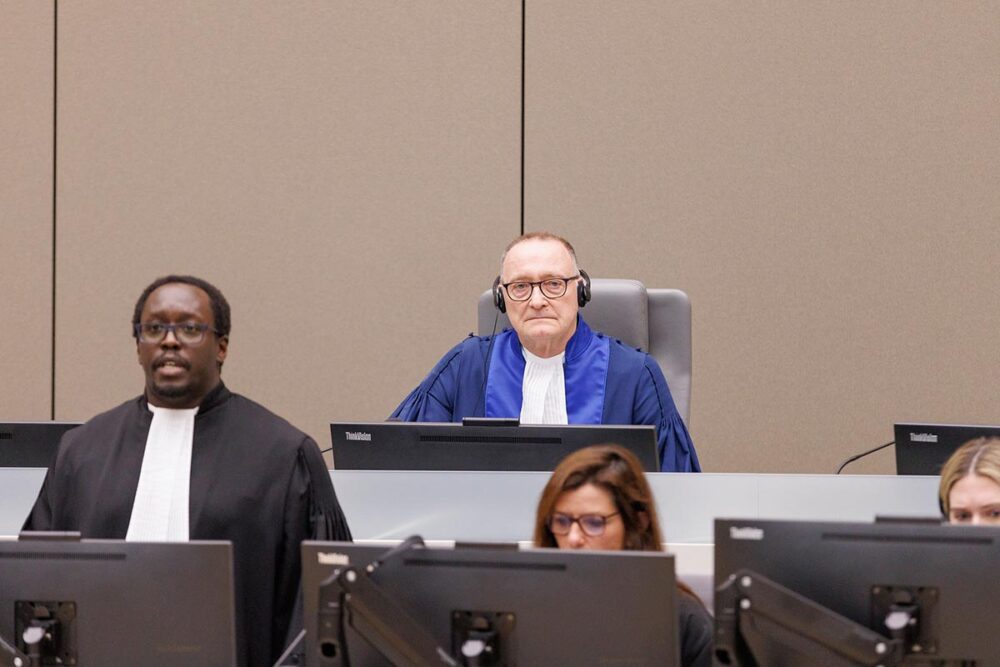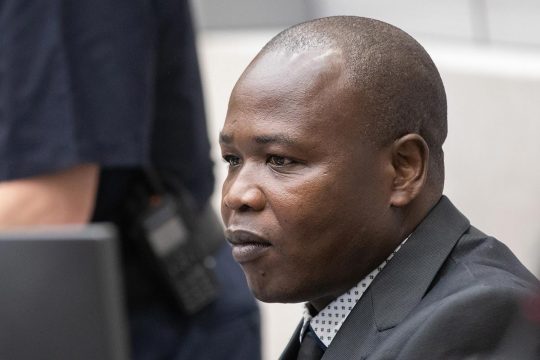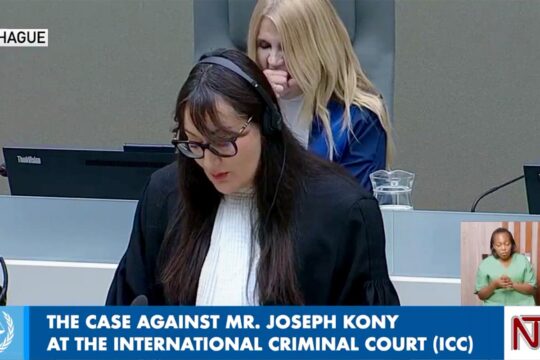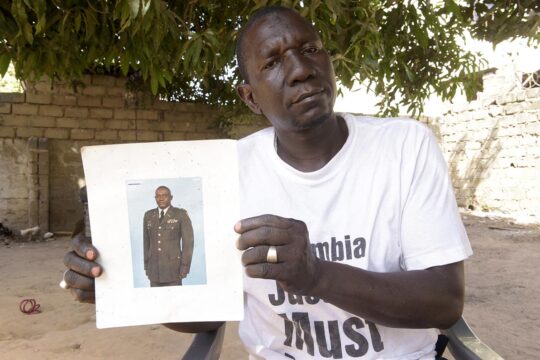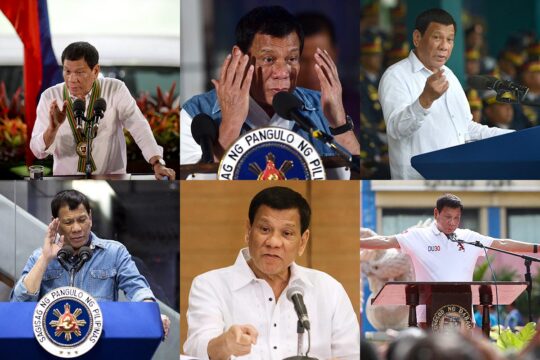By the time I made my way over to the courtroom entrance at 14:45 on February 28, the queue for courtroom security was longer than many of those I have stood in at Amsterdam’s Schiphol Airport. It seemed to be mainly composed, however, of a university class visit and staff from the International Criminal Court (ICC), rather than NGOs and other external parties. A few members of the press made their way past to take the elevator to the media room, as we all trooped into Courtroom I. Loud and excited chatter quickly gave way to hushed silence as a security guard gave two loud claps, called for quiet, and reminded us to stand “in respect for the judges” once the curtains opened.
A few minutes later they did just that, as the court actors gathered for what was likely the final performance in the long saga of the trial of abductee turned-child soldier-turned-LRA commander-turned ICC convict Dominic Ongwen.
Convicted in February 2021 of a staggering 61 counts of crimes against humanity and war crimes committed largely in Internally Displaced Persons (IDP) camps in Uganda between 2002 and 2005, Ongwen attended virtually from a room in the Norwegian prison at which he is serving his 25-year sentence. After introductions from all attending parties, including common legal representatives of the victims (‘public’ counsels appointed by the court), ICC legal representatives of the victims, Trust Fund for Victims, defence for Ongwen, and the Office of the prosecutor, presiding judge Bertram Schmitt embarked on the reading of the “Reparations Order.”
A special mention to child victims
In crisp, measured, and enunciated English, Schmitt began with a summary of the case, describing Ongwen as “a high-level member of the Lord’s Resistance Army (LRA)”. He acknowledged, right away, that the reparations pronounced were only in regard to victims who suffered harm from any of Ongwen’s 61 convictions. Noting that victims of the much longer and more widespread conflict in Uganda “may be confused and disappointed” at this limitation, he insisted that the chamber “acknowledges these victims and recognises their suffering”.
Referring to the principles for reparation outlined in the case of Congolese warlord Bosco Ntaganda, another ICC convict, Schmitt first noted that the Ongwen chamber would expand upon these principles in relation to both modalities of reparations and, significantly, child victims. This was, he explained, a result of the “extensive manner” in which children were victimised by Ongwen’s crimes. Reflection on this point in particular will undoubtedly come from many, after the reparations order has been published in full. Ongwen was notoriously once a victim himself of many of these kinds of crimes. Despite an acknowledgement from the registry that “thematic” child soldier victims made up a “very small number” of those who participated in Ongwen’s trial-proper, Schmitt heavily emphasised the nature of the harm caused to such victims. The extent of the paradox between the ICC’s acknowledgement of the seriousness of victimising children by forcing them to become child soldiers, and its complete dismissal of Ongwen’s own victimisation in his conviction, remains to be seen.
The bulk of the hearing was taken up by Schmitt’s reading of the “victims” section of the reparations order. Moving thematically through different victim groups, he pronounced the crimes whose victims would be eligible for reparations. Providing examples of the kinds of harms suffered by direct victims of the LRA attacks on Pajule, Odek, Lukodi and Abok IDP camps, he observed that “the examples are distressing”. When it came to victims of “thematic crimes”, namely sexual and gender-based violence and use of child soldiers, Schmitt was keen to stress that “so-called, I underscore so-called” wives of Ongwen himself were subjected to crimes including forced marriage, sexual slavery, and forced pregnancy. “Entire families and communities of victims...suffered tremendous harm…due to unimaginable atrocities,” Schmitt declared. Significantly, addressing what was a point of intense dispute between the parties, the Chamber recognised the “transgenerational harm” suffered by children and grandchildren of the victims. The to-be-published reparations order acknowledges all this harm “in detail”, something the judges hope will provide some symbolic satisfaction to the victims.
52,429,000 euros
The moment those in the courtroom appeared to be waiting for most eagerly was the pronouncement of “types and modalities” of reparations. In a universal gesture of intense concentration, counsel for victims Paolina Massidda took off her glasses and leaned forward. The first measure announced, due to the “overwhelming numbers” of victims, were collective, community-based rehabilitation measures to the tune of €15,000,000. This announcement earned a small but pronounced shake of the head from Massidda.
But Judge Schmitt was not finished.
The judges provided a “conservative minimum estimate” of 49,772 victims. They then announced that a “symbolic” amount of €750 was to be awarded to individual victims. In the gallery, you could almost hear the cogs whirring as many observers, including myself, tried to do the mental arithmetic. It was thankfully spelled out for us shortly afterwards. These individual victims would be awarded a total of approximately €37,329,000.
With a final €100,000 awarded for “apologies…ceremonies…memorials…et cetera”, that brought the total reparations number to €52,429,000.
Declaring that the court had found Ongwen to possess “no discernible assets”, he was declared indigent. Schmitt recognised that the Trust Fund for Victims would require significant additional funds to enact and implement these measures, and encouraged “states…organisations…and private individuals” to contribute to the fund to this end. Indeed, this amount of reparations is staggering, and a record for the ICC. In the case of Bosco Ntaganda, convicted of war crimes in 2019, a judges’ bench presided over by Chang-ho Chung, who also sat in this hearing, awarded $30,000,000, or about €27,500,000 in reparations. In the case of Thomas Lubanga Dyilo, who was also convicted for crimes against children through the conscription and use of child soldiers, a bench containing Judge Péter Kóvács – who also sat on the Ongwen reparations bench – awarded reparations of $10,000,000 or approximately €9,200,000. Not only does the Ongwen reparation number break ICC records, it defies ICC budgetary belief. In 12 months from July 2021 the Court’s Trust Fund for Victims received €3,228,059 in state contributions, €18,111 from individuals and institutions, and approximately €2,000,000 “in-kind”: a total of €5,246,170.
An implementation plan is to be provided within 6 months, and the community measures are to be designed in consultation and collaboration with victims. The court’s Victims Reparation and Participation Section, the Registry, and the court’s outreach unit are to co-operate in the dissemination and implementation of any measures designed. Schmitt concluded by expressing the chamber’s “concern and compassion” for the victims, and its “hope that sooner or later – sooner rather than later”, they would receive their compensation.
Many opinions, what solution?
Before the hearing, I had discussed my (lack of) expectations, and scepticism that any measure announced would come close to being enough, with a colleague. The Chamber undoubtedly exceeded those initial expectations.
The hundreds of victims who gathered in Gulu, Northern Uganda, to watch the proceedings in a screening organised by the ICC outreach coordinator for Kenya and Uganda, have undoubtedly had the scale of the harm they have suffered recognised by the ICC, even if Ongwen himself will not (and cannot) pay them a penny.
The next question is how soon, and how well, these reparation measures will be implemented. Judging by the animated chatter as the gallery cleared out, every attendee had an opinion on that issue. No doubt the thousands of victims, not to mention their wider communities, as well as scholars of international law, violence, and reparations, will soon add their voices to the cacophony. The ICC’s privilege of having an opinion, given the force of law in an order, does not necessarily lend itself to a practical solution. The question of how a reparations order that rivals the entire Office of the Prosecutor budget – in 2023, it asked for €59,340,000 – can possibly be achieved was, in the moment, lost in the excitement of the announcement for many. But while observers and victims may have applauded the order, the Registry and Trust Fund representatives may well have broken out in cold sweats. It will likely take frenzied initiatives, if not a downright miracle, to match ICC reparations rhetoric to any kind of reality.

Lucy J. Gaynor is PhD Researcher at University of Amsterdam and NIOD Institute for War, Holocaust, and Genocide Studies, examining the construction of historical narratives within international criminal trials.


